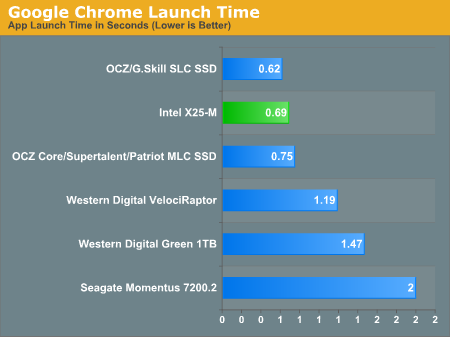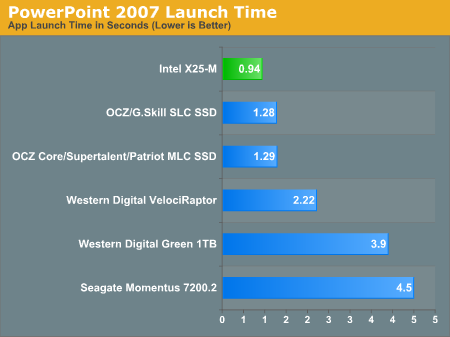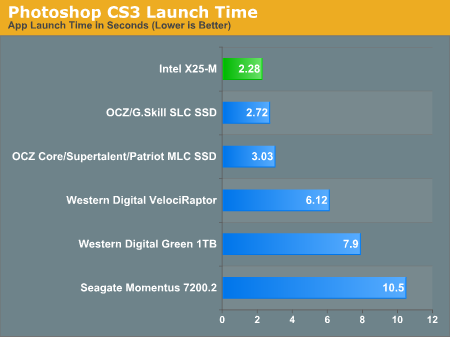Intel X25-M SSD: Intel Delivers One of the World's Fastest Drives
by Anand Lal Shimpi on September 8, 2008 4:00 PM EST- Posted in
- Storage
Application Loading Performance
You know what I hate about rebooting my machine? Starting all of my applications back up as soon as it boots, the OS is always crunching away at my disk long after I've hit my desktop and it takes forever to launch my mail application, IM client and start a web browser. These aren't complex requests, but they take forever on a conventional hard disk.
I ran a quick test to illustrate the point. I took my test image and booted it, as soon as I got a cursor in Vista I launched Adobe Photoshop CS3, PCMark Vantage, Google Chrome and Norton AntiVirus 2008. I timed how long it took for all four applications to come up. Note that this is actually a best case scenario, since my testbed image is very clean with a minimal number of applications installed. As you fill up your disk with more applications and files the disparity grows. Remember that HDD performance decreases as your drive fills up, SSD performance doesn't.
| Launch: Photoshop, Vantage, Chrome & NAV | |
| Intel X25-M (Intel, MLC) | 7 seconds |
| Western Digital Green 1TB | 15.6 seconds |
| Western Digital VelociRaptor | 12 seconds |
The differences in time here aren't huge on paper, but they are tremendous when you're actually using the machine. The funny thing about an SSD is you don't always appreciate the benefit when you've got it, but go back to a mechanical disk and it'll feel like something is wrong with your machine. The difference is noticeable.
Now let's look at individual application performance:

Google Chrome launches quickly on pretty much anything, the difference between SSDs is negligible but there is a slightly noticeable difference between running a simple, quick loading app on a HDD vs. a SSD. Again, the differences are small, but noticeable. On an SSD the application launches are instantaneous, on a HDD you can "feel" the load.

PowerPoint is similar to Chrome, but the application does take longer to load on mechanical disks. Again, the differences are noticeable - the X25-M will load PowerPoint in half the time of the VelociRaptor. You can argue that the price isn't worth it, but the point is that the load completes much faster...let's look at what happens when we're loading an application that does take a long time to start.
Photoshop takes its sweet time loading on a notebook drive, over 10 seconds on the Momentus 7200.2:

Even on the VelociRaptor it's a 6+ second ordeal. On the X25-M and all of the other SSDs, we're talking less than 3 seconds (the X25-M is naturally the fastest at 2.3 seconds).
My rule of thumb has always been that a good SSD will cut application launch times in half compared to a desktop hard drive, so if you have a particularly beefy application that takes a good while to load, expect that time to go down considerably. Remember, these are best case scenarios, in a little bit I'll start multitasking and then we'll separate the men from the boys.










96 Comments
View All Comments
Anand Lal Shimpi - Tuesday, September 9, 2008 - link
I think the question was: how much more performance is left untapped by current controller designs? The JMicron issues are a limited case, what will truly be telling is what happens when we see Intel vs. Samsung with SLC drives...The dominating the charts line was in reference to the Crysis results. If you've ever run the Crysis GPU bench you'll know that it is extremely disk intensive (particularly the first run). As I mentioned in the article, it over emphasizes the importance of disk performance but that's not to say that the results aren't valid.
I do see your point however, let me see what I can do about clarifying that statement.
-A
yyrkoon - Tuesday, September 9, 2008 - link
Ok, I guess I missed the JMicron 'thing', but to be perfectly honest I dislike *anything* JMicron and try to avoid them whenever possible. I guess I am just so interested in these Intel drives, I just tuned everyting else out. However, I did read what you mentioned about 'trouble-shooting' the JMicron MLC issue.Never ran Crysis, and do not plan on running it anytime soon if ever, but I am somewhat of a hardcore gamer.
Keep up the good work, and PLEASE do keep us informed on at least these Intel SSD drives :)
BD2003 - Monday, September 8, 2008 - link
If the achilles heel of the JMicron MLC is the random write speed, why couldnt a ram buffer be used to cache writes? Sure this would cause a serious problem if the power went out, but thats an issue some would be willing to live with.I'm fairly sure vista has an option for this in the device manager in the properties tab of a drive - "enable advanced disk performance". I wonder if that would have any effect on the results?
DigitalFreak - Monday, September 8, 2008 - link
Yet more proof that JMicron products are shit.ggordonliddy - Monday, September 8, 2008 - link
For the love of all humanity: If you are going to write for a living, please learn basic comma usage!It is NOT okay to just stick a comma in the middle of a sentence anytime you want. And it gives readers a headache.
Here is just one of numerous examples of improper comma usage I've seen so far (and I've only gotten to the 3rd page!):
"Intel certifies its drives in accordance with the JEDEC specs from 0 - 70C, at optimal temperatures your data will last even longer [...]"
The comma before "at optimal" should be replaced with a semicolon or a period (I prefer the semicolon).
Did you actually pass your English classes? I'm guessing that you probably did and you are just a product of our miserable public school system that refuses to hold students to any real level of accountability.
(And BTW, your quoting system is broken. When I enter text in the Quote Text dialog and click OK, nothing new appears in the Comment compose field.)
7Enigma - Friday, September 19, 2008 - link
Honestly man, you need to seriously relax. My personal rule of thumb for grammar is does the mistake make the understanding of the sentence difficult to comprehend.Writing something like, "Intel certifies its drives in accordance with the JEDEC specs from 0 - 70C, at optimal temperatures your data will last even longer [...]", while not grammatically correct is completely readable.
If it was something like, ""Intel certifies drives to accordance with the JEDEC specs from 0 - 70C, at optimal data your temperatures will last even longer [...]", now you have a legitimate beef.
The former can easily be forgiven, the latter makes my head hurt when I read it. Trust me, whatever you do, do not go to Dailytech.com and read the articles. Those even I get annoyed at frequently and I'm very forgiving.
Anand Lal Shimpi - Tuesday, September 9, 2008 - link
You're quite right, thanks for the heads up :) Some of the article was directly from my notes while I was working on the tests, so that's one source of unpolished bits. I know I'm far from perfect, so I do appreciate your (and anyone else's) assistance.Thanks :)
Anand
pkp - Tuesday, September 9, 2008 - link
Thanks for posting, Anand. I see you're already aware of the problem, but I wanted to throw my two cents in.What is the usual editing process? I think a once over by a second set of eyes would have caught the bulk of the grammatical errors.
Of course, the ultimate issue isn't commas. It's readability. However, the problem was bad enough that I'm making this comment without having even gotten through the first page of this article.
JarredWalton - Tuesday, September 9, 2008 - link
I'm often the content editor for posted articles, but often we skip that stage due to late nights and schedules. Doing a final thorough edit can require a couple hours (edit and then HTLM-ize), and when someone finishes an article at 5AM or whatever and it's an NDA type piece, delaying it any further is usually not desired by the readers or us.I do read all posted articles, and often I take the time to go through and fix any noteworthy errors. A few misplaced commas don't really detract from a 5000 word article, however, and depending on what else is going on I may or may not edit the text. If anyone takes the time to point out specific errors, i.e. "on page 3 you write "...." they always get corrected - at least if I see it. General complaints are much more difficult to address though, i.e. "You used passive voice and therefore you must DIE!" LOL.
I know personally that when you write a long article with lots of testing, certain thoughts tend to appear in multiple places and the final result isn't always as coherent as I would like. Trying to "fix" problems relating to flow and readability is difficult at best, and requires more time than we generally spend. If anyone wants to make specific suggestions, though, we're open for input as always.
Perhaps it's useful to compare the process to print publications. Magazines usually have several editors on staff whose job is solely to edit other authors' work; I can say that we don't have anyone at AnandTech in that position these days. (I edit some of the articles, but not all, and even then I make mistakes.) That's probably why we have more typos than magazines, but then we provide far more thorough coverage as well. Last I saw, most magazine hardware reviews end up being one page and ~1000 words, with a couple charts.
At the end of the day, I get most of my detailed information from the internet. Magazines might be more grammatically correct, and they make for great toilet reading, but I don't generally depend on them as a source of credible information. I'd say it's safe to say we won't see such an in-depth exploration of SSD performance and issues in any magazine. [Now I have to prepare to have someone point me to an article in some magazine that does exactly that.]
Cheers,
Jarred
KikassAssassin - Tuesday, September 9, 2008 - link
Then I guess I should point you to an article in last month's issue of my favorite data storage magazine.http://www.solidstatedisksmonthly.com/2008/08/ever...">http://www.solidstatedisksmonthly.com/2...erforman...
Unfortunately, their website seems to be down at the moment, but keep checking it, I'm sure it'll be back up soon (and don't be fooled by the article's title. It's actually only 23 pages without the ads).